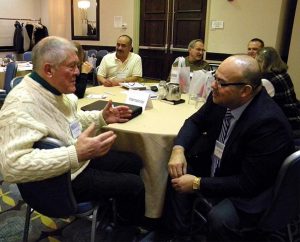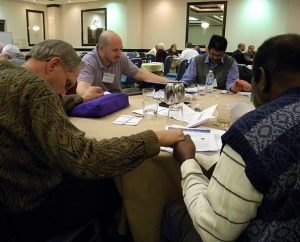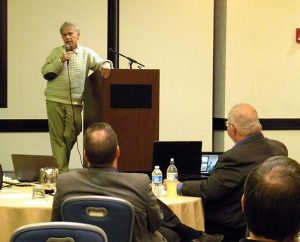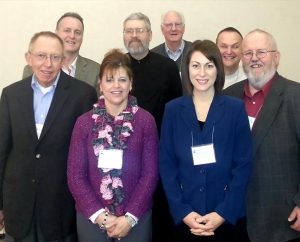By Paula Schlueter Ross
ST. LOUIS — “This organization is about mission. It’s about reaching out with the Gospel … domestically and internationally,” said David Saving on the opening day of this year’s national conference of the Association of Lutheran Mission Agencies (ALMA).
Saving, ALMA president during the 2012-14 biennium, encouraged some 80 conference attendees to network with one another to “find new ways that you can take the Gospel” to others.

That sharing and collaboration is the real beauty of ALMA, say the organization’s members, who serve dozens of mission agencies that have LCMS ties but operate independently of the church body.
The Rev. Dan Gilbert, president of the LCMS Northern Illinois District, attended the Jan. 30-31 ALMA conference here — his first — along with three others from the district, and told Reporter the conference “was definitely worth the time invested.
“The best part by far was making connections with others in the LCMS who are actually doing the Lord’s mission. Our district staff … made multiple connections with missions and people we didn’t know before and strengthened ties with a few we did know. We hope we were encouraging to others, as well.”
Gilbert said it was valuable for him, as a district president, to be at the conference, which was sponsored by the LCMS and Lutheran Hour Ministries. “Learning new ideas for Lutheran schools, for urban, suburban, small town and rural churches — all these things were very helpful.
“I came away with new ideas for new things for congregations to do to reach out to their communities with the love of Jesus. We’re always looking for new ways for members to be the hands, feet and voice of Jesus in their communities, and we’re glad to share our ideas with others as well.
“Every congregation can always find at least one new thing to serve their community in Jesus’ name,” Gilbert said.
Northern Illinois is one of two LCMS districts that have ALMA memberships; the other is the Atlantic District Mission Society.
New at this year’s conference was a booklet of one-page profiles of ALMA member agencies — from Alaska Mission for Christ, based in Anchorage, to World Mission Prayer League, in Minneapolis — that was distributed to attendees. Representatives of 27 ALMA organizations attended the two-day conference, which included Bible study, plenary presentations, prayer, workshops and table discussions.

As Bible study leader, the Rev. Dr. Douglas L. Rutt described how God prepared the Apostle Paul — a Jew fluent in the Greek language — to be a “powerful witness” for Him. In 2 Corinthians, Paul relates how his suffering and struggles as a Christian missionary empowered his Gospel witness, noted Rutt.
“God uses us in spite of our frailties,” said Rutt, director of International Ministries with Lutheran Hour Ministries, St. Louis. “In our own weaknesses, Jesus can be magnified” in our lives and ministries.
Rutt told a story about the Rev. Dave Andrus, who became blind when he contracted a disease in his youth, but went on to become a pastor and a leader in LCMS blind ministry. Andrus is director of Christian outreach for Lutheran Braille Workers, Yucaipa, Calif.
During a presentation the two attended, Andrus questioned the speaker about whether or not disease is “always bad” because he didn’t know what kind of man he would have become if not for his blindness.
Said Rutt: “God does shape us into the kind of people who can be powerful witnesses.”
In his presentation on “Barriers to the Gospel,” Dr. Michael Rodewald posed the question, “If one proclaims the Gospel but it is not heard, has the missionary task been accomplished?” Rodewald, regional director for Africa with the LCMS Office of International Mission, has accepted a call to serve as executive director of Lutheran Bible Translators, beginning June 1.
Failure to consider context across cultures often results in barriers raised to the message you’re trying to convey, said Rodewald, who has spent 33 years in Africa and said it has taken him “a lifetime” to adjust to life on that continent because of the cultural differences.
For example, Africans “prize relationships over all,” while Americans are “willing to sacrifice relationships to get a task done.” In Kenya, when a group is meeting, the person with the most-trusted position speaks last, while Americans try to get in their comments right away, regardless of position or authority.
Sin, too, can be perceived differently, according to Rodewald. In northern Liberia, he said, Africans equate adultery on about the same par as an American would rank driving over the speed limit.
He encouraged missionaries to be “very intentional” about sharing Christ in their words — and actions — so that those in other cultures “see Christ in all that we say and do.”
In her presentation, “Pray and Witness,” Kay L. Meyer, founder and president of Family Shield Ministries, St. Louis, reminded ALMA members to pray for opportunities to share God’s love with others.
“It’s not prayer that’s powerful, it’s God that’s powerful,” she said. Meyer, author of Witnessing — A Lifestyle, recommended IPray: A Simple Prayer Book for Ministry, Mercy and Multiplication, an e-book by the Rev. James Buckman, a missionary with the LCMS New Jersey District.
She asked conference-goers to discuss their needs and then “spend some time in prayer with those at your table.” She also urged them to share examples of how God had answered their prayers in the past, and encouraged them to “decide who [specifically] you’re going to pray for” — particularly those in their lives who do not yet know Christ.

Prolific author, longtime professor and former LCMS Vice-President Rev. Dr. Paul L. Maier led a presentation on “Defending the Faith.” Calling today’s world “the most fascinating time to be alive in Christian history,” Maier said that in spite of many “attacks on Christianity” worldwide, there is now more evidence than ever “affirming the biblical history.”
Maier said Christianity is the fastest-growing religion, which is why it’s a target for attacks, and he encouraged Christians to defend their faith with an “intellectual approach.”
Christianity’s “long suit is history” — the cities and names in the Bible are real, and some 93 percent of Scripture can be verified through history, geography and archeology, Maier said, adding that information in the holy books of other religions, except Judaism, can’t be found in historical accounts.
“We’re in this very, very secular world,” he said, and “we’re going to lose marginal [Christian] people” who will start believing the anti-Christian smears. “It’s time for Christians to be less prone to sit on their hands and to speak back.”
But “despite these attacks,” he added, “the Christian faith has never been easier to defend.”
In her presentation on fundraising, Dawn M.S. Miller, director of Consulting, Fund Development Services, with Zielinski Companies, St. Louis, said it’s “absolutely essential” for nonprofits to have an “urgent, relevant and compelling case for support” — a written document that tells why they’re worthy of philanthropic gifts — and she shared guidelines for developing such a document.
Fundraising is really about “building relationships with other people,” Miller said, and “really good fundraisers can tell a really good story” about how the nonprofit is making a difference in peoples’ lives.
During his banquet presentation, the Rev. Dr. Jack Preus, executive vice-president for Mission Advancement with Bethesda Lutheran Communities, Watertown, Wis., described the “New Model for Mission Partnership” that’s been forged by Bethesda and its partners — the LCMS Office of International Mission and two Synod districts: Wisconsin South and English.
Members of LCMS congregations today “want to be hands-on involved directly” in overseas missions, he said, which has led to a proliferation of mission societies, such as those that are members of ALMA.
“Overall, this is wholesome. It is good and it is right,” he said. “And just as importantly, it’s irreversible” and “a new reality,” so we might as well “make the best of it.”

Bethesda’s “new mission model” in the Dominican Republic is marked by shared governance, strategic planning, joint decision-making and clear and frequent communication among all the partners, he said, who are working together to assist the emerging Dominican Lutheran Mission and its outreach to children with disabilities. “Through this partnership, lives have been enhanced and we have seen miracles occur,” said Preus.
“This model is one — and I commend it to you — that could well look like the future of missions in the LCMS,” he said. “We are all witnesses of what God has done for us through our Lord Jesus Christ. We may not all necessarily be able to go to the ends of the earth, but through strategic partnerships and collaboration, we can all participate in God’s mission to all nations.”
Among workshops offered during the conference:
- the Rev. Dr. Alan Scott, executive director of Lutheran Multicultural Mission, Indianapolis, described results of his 2006-07 survey of missionaries in which 41 of 50 respondents reported experiencing trauma on the mission field.
Things that helped them recover included internal strength, support networks, the Christian life, “being LCMS Lutherans,” being part of “God’s mission” and being committed to following God’s call.
Scott recommended the book Healing the Wounds of Trauma: How the Church Can Help, by Harriet Hill, Margaret Hill, Dick Baggé and Pat Miersma, for missionaries who work among traumatized populations.
- Cynthia Khan, director for Women and Youth Ministries with People of the Book Lutheran Outreach, Dearborn Heights, Mich., addressed “Responding and Witnessing to Muslims.” Khan, who was born and raised in Pakistan, described Islam’s Sharia law, how the religion began, what Muslims believe and how their worldwide population is growing.
She encouraged Christians to approach Muslims and initiate conversations, and she warned Christians not to place Bibles on the floor because “it’s very offensive to Muslims.”
Salvation, the love of Christ on the cross and forgiveness — all free — are “big draws to Muslims,” Khan said, because in the Islam faith such things have to be earned.
Also during the conference, ALMA members elected new officers to two-year terms:
- the Rev. James Tino of Miramar, Fla., president.
- Chris Myers, St. Louis, first vice-president.
- Carly Hatcher, Ann Arbor, Mich., second vice-president.
- the Rev. Dr. Alan Scott, Indianapolis, secretary.
- the Rev. Jeff Thormodson, St. Louis, treasurer.
Also serving in an auxiliary capacity are:
- the Rev. Miguel Torneire, St. Peters, Mo., ethnic ministry liaison.
- the Rev. Ken Reiner, Chambers, Neb., operations manager.
- Harold Rau, Wildwood, Mo., webmaster.
The Rev. Dr. Johnson Rethinasamy, mission executive with the Atlantic District and senior pastor of Immanuel Lutheran Church, Whitestone, N.Y., described the conference as “a very good gathering of learning, listening, exchanging ideas and best practices, mission experiences and exchanging first-hand stories between the mission fields.”
He said he would “encourage whoever is engaged in missional entities locally and globally to be a part of ALMA.”
For more information about the Association of Lutheran Mission Agencies, visit its website at almanetwork.org.





thank you for the interesting information — sounds as though all of our congregations would benefit with ideas shared at this conference — as we all want to be sharing the Gospel but we are not all reaching out as well as we could.. Liked the comment that it is not that prayer is powerful but it is God who is powerful. Reminds me that prayer changes us and that is how we are strengthened through prayer